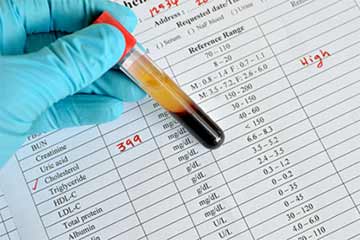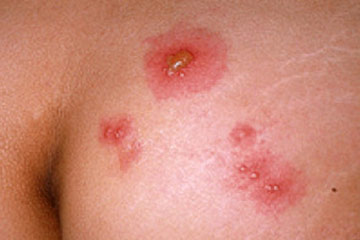Meningococcal Disease
What is meningitis?
Meningitis is an infection of the fluid of a person's spinal cord and the fluid that surrounds the brain. People sometimes refer to it as spinal meningitis. Meningitis is usually caused by a viral or bacterial infection. Knowing whether meningitis is caused by a virus or bacterium is important because the severity of illness and the treatment differ. Viral meningitis is generally less severe and resolves without specific treatment, while bacterial meningitis can be quite severe and may result in brain damage, hearing loss, or learning disability. For bacterial meningitis, it is also important to know which type of bacteria is causing the meningitis because antibiotics can prevent some types from spreading and infecting other people. Before the 1990s, Haemophilus influenzae type b (Hib) was the leading cause of bacterial meningitis, but new vaccines being given to all children as part of their routine immunizations have reduced the occurrence of invasive disease due to H. influenzae. Today, Streptococcus pneumoniae and Neisseria meningitidis are the leading causes of bacterial meningitis.
What are the signs and symptoms of meningitis?
High fever, headache, and stiff neck are common symptoms of meningitis in anyone over the age of 2 years. These symptoms can develop over several hours, or they may take 1 to 2 days. Other symptoms may include nausea, vomiting, discomfort looking into bright lights, confusion, and sleepiness. In newborns and small infants, the classic symptoms of fever, headache, and neck stiffness may be absent or difficult to detect, and the infant may only appear slow or inactive, or be irritable, have vomiting, or be feeding poorly. As the disease progresses, patients of any age may have seizures.
How is meningitis diagnosed?
Early diagnosis and treatment are very important. If symptoms occur, the patient should see a doctor immediately. The diagnosis is usually made by growing bacteria from a sample of spinal fluid. The spinal fluid is obtained by performing a spinal tap, in which a needle is inserted into an area in the lower back where fluid in the spinal canal is readily accessible. Identification of the type of bacteria responsible is important for selection of correct antibiotics.
Can meningitis be treated?
Bacterial meningitis can be treated with a number of effective antibiotics. It is important, however, that treatment be started early in the course of the disease. Appropriate antibiotic treatment of most common types of bacterial meningitis should reduce the risk of dying from meningitis to below 15%, although the risk is higher among the elderly.
Is meningitis contagious?
Yes, some forms of bacterial meningitis are contagious. The bacteria are spread through the exchange of respiratory and throat secretions (i.e., coughing, kissing). Fortunately, none of the bacteria that cause meningitis are as contagious as things like the common cold or the flu, and they are not spread by casual contact or by simply breathing the air where a person with meningitis has been.
However, sometimes the bacteria that cause meningitis have spread to other people who have had close or prolonged contact with a patient with meningitis caused by Neisseria meningitidis (also called meningococcal meningitis) or Hib. People in the same household or day-care center, or anyone with direct contact with a patient's oral secretions (such as a boyfriend or girlfriend) would be considered at increased risk of acquiring the infection. People who qualify as close contacts of a person with meningitis caused by N. meningitidis should receive antibiotics to prevent them from getting the disease. Antibiotics for contacts of a person with Hib meningitis disease are no longer recommended if all contacts 4 years of age or younger are fully vaccinated against Hib disease (see below).
Are there vaccines against meningitis?
Yes, there are vaccines against Hib, against some serogroups of N. meningitidis and many types of Streptococcus pneumoniae. The vaccines against Hib are very safe and highly effective.
There are two vaccines against N. meningitidis available in the U.S. Meningococcal polysaccharide vaccine (MPSV4 or Menomune®) has been approved by the Food and Drug Administration (FDA) and available since 1981. Meningococcal conjugate vaccine (MCV4 or MenactraT) was licensed in 2005. Both vaccines can prevent 4 types of meningococcal disease, including 2 of the 3 types most common in the U.S. (serogroup C, Y, and W-135) and a type that causes epidemics in Africa (serogroup A). Meningococcal vaccines cannot prevent all types of the disease. But they do protect many people who might become sick if they didn't get the vaccine. Meningitis cases should be reported to state or local health departments to assure follow-up of close contacts and recognize outbreaks.
MCV4 is recommended for all children at their routine preadolescent visit (11 to 12 years of age). For those who have never gotten MCV4 previously, a dose is recommended at high school entry. Other adolescents who want to decrease their risk of meningococcal disease can also get the vaccine. Other people at increased risk for whom routine vaccination is recommended are college freshmen living in dormitories, microbiologists who are routinely exposed to meningococcal bacteria, U.S. military recruits, anyone who has a damaged spleen or whose spleen has been removed; anyone who has terminal complement component deficiency (an immune system disorder), anyone who is traveling to the countries which have an outbreak of meningococcal disease, and those who might have been exposed to meningitis during an outbreak. MCV4 is the preferred vaccine for people 11 to 55 years of age in these risk groups, but MPSV4 can be used if MCV4 is not available. MPSV4 should be used for children 2 to 10 years old, and adults over 55, who are at risk.
Although large epidemics of meningococcal meningitis do not occur in the United States, some countries experience large, periodic epidemics. Overseas travelers should check to see if meningococcal vaccine is recommended for their destination. Travelers should receive the vaccine at least 1 week before departure, if possible. Information on areas for which meningococcal vaccine is recommended can be obtained by calling the centers for Disease Control and Prevention at (404)-332-4565.
There are vaccines to prevent meningitis due to S. pneumoniae (also called pneumococcal meningitis) which can also prevent other forms of infection due to S. pneumoniae. The pneumococcal polysaccharide vaccine is recommended for all persons over 65 years of age and younger persons at least 2 years old with certain chronic medical problems. There is a newly licensed vaccine (pneumococcal conjugate vaccine) that appears to be effective in infants for the prevention of pneumococcal infections and is routinely recommended for all children greater than 2 years of age.
centers for Disease Control and Prevention
http://www.cdc.gov/






